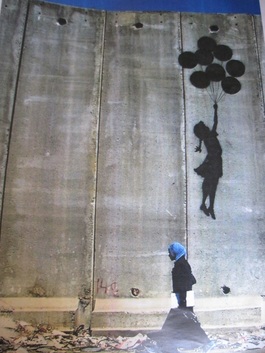 This is the fourth installment in a series about my trip to the West Bank in May, 2015. Sraddha and I awakened this morning with a groan. Barking dogs kept us awake until almost dawn. Our Ramallah hostess and organizer of our visit said that “since the bombing of Gaza, the dogs have been barking.” It was a hot night and now with only two or three hours sleep, we were facing a hot muggy day. Our taxi was waiting at the front door as usual to take us to the center of town for our final day of teaching. The women dragged into the room, fully garbed on this hot morning. Off came the Abaya, the black over-cloth covering the body and the Hijab that covered every strand of hair on the head. I took one look at them and changed the plans Shraddha and I had worked out the night before. “Let’s start with Savasana, the Corpse Pose.” A senior teacher, the only teacher in Nablus exclaimed with a sigh of relief, “Oh! I said coming through the long lines of checkpoints this morning that maybe Rama would give us Savasana!” Shraddha and I began with the alignment for maximum relaxation in the pose, and then went on to introduce how they could mentally and emotionally stay in Savasana as they practiced forward bends to lengthen the hamstrings and release emotional build up of tension in the calves. Their adjustments of one another were loving and tender. They seemed to have no fear of touching or being touched. Today we did not have a myriad of distractions as we had the day before when they had to be on the alert because a repairman was expected. Throughout these four days, their cell phones would have a rotating cacophonous ring tones, some in Arabic sounds and others in strongly audible melodious sounds. The women would not turn off their phones or apologize for its interruption, but would jump out of whatever posture they were in to take a call. It truly was like they were answering the call of God. Shraddha, Suzanne and I were astonished at first until we realized that in the continuing restrictions in this culture where one did not know what would happen from one day to the next, there could be any kind of danger or emergency. We did not ask them to turn off their phones as we would at home, but rose to a new height of understanding. How I loved these beautiful strong and resourceful human beings! Now, this last day, we put them in backbends over chairs and on the walls for shoulder stand, this time coming away from the wall. Shraddha led them in a long, much-needed Savasana (the corpse pose). Some of the women were already having less tension in their necks, and solar plexus. Their shoulders and spine were straighter and pains were disappearing. They loved the idea that all postures are Savasana, if they do the pose with an extended neck and a relaxed brain and mind, without effort and especially with the breath. One woman said that after only two hours, the swelling of her legs went down. Another young woman said the joint pain she had in the beginning of the week was gone and others remarked about feeling more peaceful, regardless of what was happening around them which included standing at the checkpoints. Shraddha and I had only about ten hours to work with them over four days, but their testimonies, radiant faces and loving goodbyes, said to us that even this small offering of ours was of great importance to them. I almost cried as the women were asking about the meanings of the Sanskrit sounds … and how, even in their strict Islamic culture … they loved chanting the sound of Om. Their voices and projection of the sound principle -- of the absolute -- grew stronger with each class. As I repeated Shanti three times, I explained, the first time it means peace with yourself; the second time, it means peace with your families, friends, co-workers and colleagues, especially peace to those with whom you have had challenges in the past; and third, peace beyond every border or boundary of nations, states and peoples, peace throughout the world. The matriarch of the group asked, “What did you say that Shanti means?” As I said, “it is the ancient Sanskrit word for peace,” she excitedly called out three times in Arabic to the women in the room, “Salaam, Salaam, Salaam.” (In Hebrew, Shanti, Shanti, Shanti would translate as Shalom, Shalom Shalom.) Tomorrow, we move to the Christian community of Bethlehem, from the Hebrew word Beit, which means house or dwelling place and - Salaam - of peace. Who knows what adventures and miracles will unfold in the path that lies before us! That night I couldn’t sleep at all. The winds were howling and I was so eager to get to Bethlehem that a child-like anticipation of the future kept me awake all night. Arabic words kept wafting through the portals of the mind as images of the Palestinian women kept appearing before me. The cells of my body were dancing every which way trying to reconcile the past with the present.
0 Comments
Leave a Reply. |
Archives
August 2020
Categories |
Live Chat Support
×
Connecting

You:
::content::
::agent_name::
::content::
::content::
::content::
 RSS Feed
RSS Feed